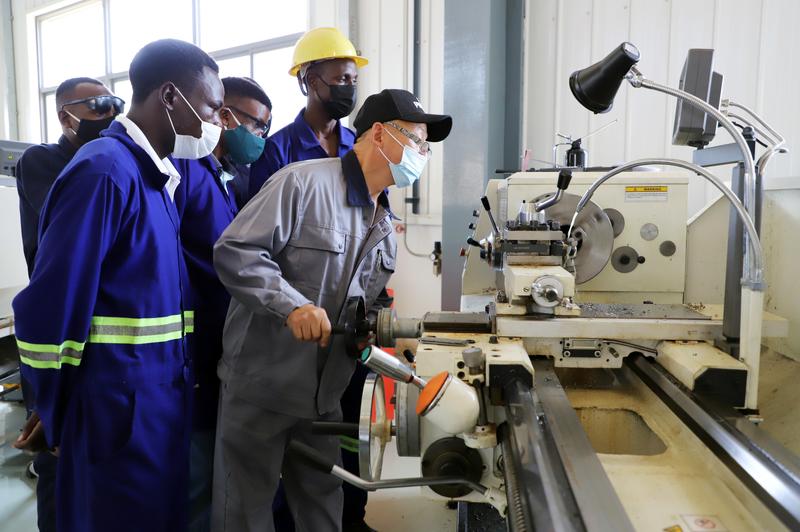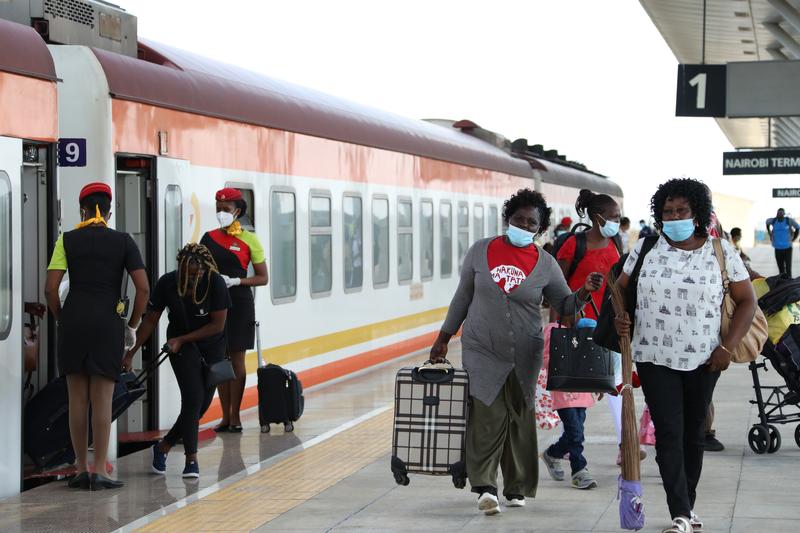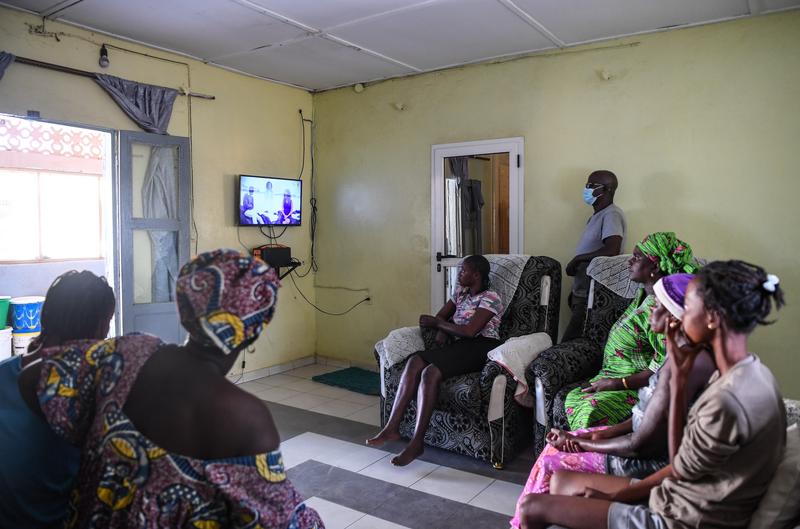From power to ports, ventures with support from China spur hopes for local recovery
 A Chinese instructor shows local trainees how to operate a machine at the China-funded Uganda Industrial Research Institute at Namanve Industrial Park in Mukono district in Uganda on Nov 9. (ZHANG GAIPING / XINHUA)
A Chinese instructor shows local trainees how to operate a machine at the China-funded Uganda Industrial Research Institute at Namanve Industrial Park in Mukono district in Uganda on Nov 9. (ZHANG GAIPING / XINHUA)
Work on infrastructure projects backed by the Belt and Road Initiative maintained a steady pace in Africa last year, thanks in part to some creative ways of managing construction tasks during the pandemic.
Smaller work teams were part of the solution at construction sites as African nations pin their hopes on BRI projects to rebuild their economies from the impact of COVID-19 and address a widely acknowledged deficit in vital infrastructure.
The BRI-backed projects also provide plenty of jobs for Africans at a time when many have been thrown out of work because of the restrictions imposed to control the pandemic.
The need for infrastructure in Africa is clear. Almost 600 million people in sub-Saharan Africa lack access to grid electricity, accounting for more than two-thirds of those worldwide in this predicament. About a third of people in rural areas have no sealed roads serving their communities, data from African Development Bank indicate.
The bank estimates the continent's infrastructure needs at $130-$170 billion a year, with a financing gap in the range of $68-$108 billion.
The Legatum Institute, a think tank in London, said a third of the continent's financing needs are required for the maintenance of existing facilities.
To realize such levels of expenditures, African countries are required to spend an additional 1 percent of GDP annually on infrastructure, above the 3.5 percent that has been spent consistently since 2000, the institute said in a report for 2021.
Still, Africa is gradually making progress on infrastructure thanks to China, which is providing technical skills and funding through the BRI and the Forum on China-Africa Cooperation, a bilateral platform that has helped bring China and Africa closer together.
According to the Africa Policy Institute, a pan-African think tank in Nairobi, China is not only upgrading rural roads but is also helping to develop the Trans-African Highway Network of more than 56,000 kilometers, according to estimates.
"By contributing to the development of Africa's highway infrastructure and opening up of road-based corridors, China is helping Africa to win the war on poverty eradication through trade promotion and overall economic growth," the institute said in a report released in November.
By late that month, 52 of the 55 members of the African Union were participating in the BRI, which was proposed by China in 2013 as a means of improving connectivity among countries through increased trade, economic integration, and cultural exchanges. The BRI projects have shown resilience in the face of the pandemic.
According to China's Ministry of Commerce, China's direct investment in Africa reached $2.07 billion from January to July, outperforming the pre-pandemic level in the same period of 2019.
As part of efforts to enhance anti-pandemic cooperation, Chinese firms were quick to resume operations in Africa after initial disruptions caused by the pandemic.
 Passengers at Nairobi station of Mombasa-Nairobi Standard Gauge Railway in Kenya on Nov 17. The Chinese-built railway has operated for more than four years. (DONG JIANGHUI / XINHUA)
Passengers at Nairobi station of Mombasa-Nairobi Standard Gauge Railway in Kenya on Nov 17. The Chinese-built railway has operated for more than four years. (DONG JIANGHUI / XINHUA)
Joint program
According to a white paper on China-Africa cooperation released by China's State Council Information Office in November, more than 1,100 China-Africa joint programs have continued and nearly 100,000 Chinese technicians and workers have remained at their posts in Africa throughout the pandemic.
One such project that has been progressing steadily is the Nairobi Expressway in the Kenyan capital. Costing $600 million, the roadway will reach 27 kilometers with four lanes. It will connect the Jomo Kenyatta International Airport with the western part of the city via Nairobi's central business district.
Work began in June 2020 on what will become the first toll road in the East African country.
The Kenya National Highways Authority said more than 75 percent of the work has been carried out, and the expressway is due to open in June.
Paul Maringa, the principal secretary for infrastructure, said the project implementers had to be extremely well organized to ensure that work schedules were maintained despite the obstacles posed by the pandemic.
"We broke down the work teams into smaller work teams and that basically removes congestion in any work area," Maringa said.
"We also chose to adopt the principle of working 24 hours. That meant we worked during the day and the night. That way we got in more working time because the night is not a constraint for us."
More than 4,000 Kenyans have been employed for the project, which is financed by the China Road and Bridge Corporation under the business model of build-operate-transfer.
Another high-profile project in the country is Lamu Port, part of an ambitious transport corridor linking the country with South Sudan and Ethiopia.
The first three berths at the site were commissioned in June 2021. The China Communications Construction Co, the contractor for the project, got work underway in October 2016.
Aside from the port, other vital infrastructure-including roads, airports, a railway, a dam and even cities-will be built under a grand project called the Lamu Port-South Sudan-Ethiopia Transport Corridor. The megaproject has a price tag of more than $29 billion.
For Lamu Port, more than 1,500 people have so far been hired at the site, according to Africa Policy Institute.
In Senegal, the construction of the Foundiougne Bridge, the longest bridge in West Africa, has likewise proceeded despite the pandemic. The 1,300-meter bridge is being constructed by China Great Wall Industry Corporation and China Henan International Corporation Group. The bridge will serve as a shortcut to Gambia and the Casamance region of Senegal.
In North Africa, Egypt's new administrative capital-taking shape 45 kilometers east of Cairo-is another key BRI project that has proceeded despite the pandemic.
Covering 700 square kilometers, the new city is expected to accommodate 6.5 million people as well as the nation's parliament, government agencies, embassies, and ministries.
Chinese banks provided most of the financing for the new city that is expected to decongest the current capital Cairo.
In broad terms, the pace of work under BRI projects in Africa slowed down in the first quarter of 2021. But Chinese financing and investment activities picked up again in the second quarter with an increase from the previous quarter of 36.9 percent, according to Green Finance and Development Center, a think tank focused on sustainable finance and energy.
 Senegalese enjoy satellite television on the outskirts of Dakar on Nov 22 thanks to a device provided by Chinese media company StarTimes under a China-funded project. (LI YAN / XINHUA)
Senegalese enjoy satellite television on the outskirts of Dakar on Nov 22 thanks to a device provided by Chinese media company StarTimes under a China-funded project. (LI YAN / XINHUA)
Investment commitments
During the eighth ministerial conference of the Forum on China-Africa Cooperation in Senegal in November, China committed to deepening its investments in Africa's infrastructure needs.
Moussa Faki Mahamat, the chairman of the African Union Commission, signed a memorandum of understanding with He Lifeng, the head of China's National Development and Reform Commission, in December.
"The MoU covers priority sectors such as health, food security, infrastructure and energy," Mahamat wrote on Twitter.
The Africa Policy Institute, in particular, has drawn attention to China's investments in ports under the BRI. Facilities like Lamu in Kenya are expected to provide new gateways to the continent, better link the region to world markets and boost trade and economic development.
Data from the institute indicate that there are some 46 existing or planned port projects in sub-Saharan Africa benefiting from Chinese involvement. Chinese companies have served funders or builders.
Adhere Cavince, a scholar of international relations in Nairobi, said Chinese companies have made huge contributions to infrastructure modernization in Africa through the BRI.
Chinese investors have been increasingly focusing on emerging industries, such as pharmaceuticals and the digital economy, areas of attention that will help secure the continent's economic transformation, he said.
edithmutethya@chinadaily.com.cn


